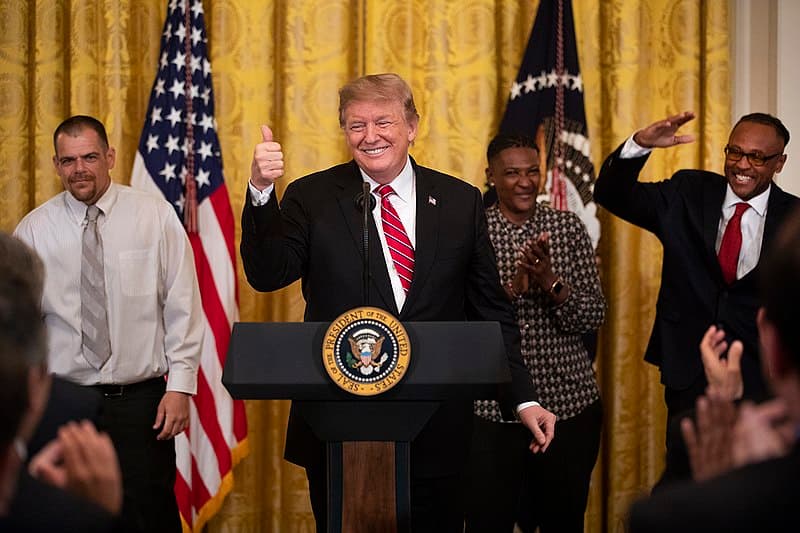Trump Faces a Teachable Moment on Criminal Justice Reform
If he seizes the chance, it could make a difference in his coming campaign.

The 91 criminal charges President Trump is facing offer the Republican presidential candidate an unusual opportunity: a chance to make the case for additional reforms to our nation’s deeply flawed criminal justice system.
Criminal justice reform was one of the accomplishments of the Trump presidency. In December 2018, Mr. Trump signed into law the First Step Act, which reduced some federal mandatory minimum sentences. It also included measures aimed at making prisons more humane and easing the re-entry into society of prisoners who had served their time.
The act was notable for its broad and bipartisan support, even during a presidency marked by partisan polarization. It passed the Senate on an 87-to-12 vote (it would have been 88 to 12, but Senator Graham was in Afghanistan on that day) and passed the House 358 to 36. Separately, Mr. Trump also used his pardon power to grant clemency to quite a few deserving recipients.
When Mr. Trump signed the First Step Act, he made clear that it was, as its name indicates, not the final word on the issue of criminal justice reform. “This is First Step, but there’s going to be a second and a third and possibly a fourth,” Mr. Trump said.
The indictments provide a concrete case study of why those additional steps remain necessary. The New York Sun (“Trump, Giuliani, and the RICO Racket Redux”) and the Wall Street Journal (“Indictment Four: Trump as Racketeer”) have expressed caution about, and noted the irony of, the use against Mr. Trump — and his co-defendant, Mayor Giuliani — of a Georgia law modeled on the federal Racketeer Influenced and Corrupt Organizations Act.
The 1995 book “Payback: The Conspiracy to Destroy Michael Milken and His Financial Revolution,” by a former dean of the University of Chicago Law School, Daniel Fischel, goes even further, concluding that “repealing RICO altogether, at least for nonviolent financial ‘crimes’ would be a major step in the right direction.”
Let a repeal of state and federal racketeering acts be part of the pruning back of a system of criminal law that has evolved to empower prosecutors rather than protect public safety and the principles of justice.
The Racketeer Influenced and Corrupt Organizations Act is only one of many ways that the Trump charges illustrate a criminal justice system gone awry. Another is the way that “conspiracy” charges are used to inflict a kind of double jeopardy on defendants.
This is routine. Criminal defendants get charged once for an underlying crime, then a second time for the thought crime of having “conspired,” or planned, the crime with which they are charged.
In a case involving a frequent New York Times opinion writer accused of being a paid foreign agent of Iran, Judge Edward Korman advised the defendant, Kaveh Afrasiabi, who has pleaded not guilty, “You shouldn’t worry about the conspiracy. … That is a common form of charging to unnecessarily complicate cases.”
Of the 91 charges against Mr. Trump, fully 10 are some variation on “conspiring,” by my analysis of a Bloomberg News count. Mr. Trump the presidential candidate could call on Congress and state legislatures to repeal these conspiracy laws, which outlaw planning alleged crimes rather than actually committing them.
Another criminal law overdue for repeal is the one making it a crime to make a false statement to the federal government. What a breathtaking asymmetry. The government lies to citizens routinely. Remember, “If you like your health care plan, you will be able to keep your health care plan”?
Yet if a citizen makes the error of uttering a falsehood to the government instead of invoking the Fifth Amendment right against self-incrimination, the law, in Title 18 of the United States Code, Section 1001, permits the government to turn that falsehood into a federal crime in its own right.
Justice Ruth Bader Ginsburg warned of the law’s “sweeping generality,” expressing concern “that an overzealous prosecutor or investigator — aware that a person has committed some suspicious acts, but unable to make a criminal case — will create a crime by surprising the suspect, asking about those acts, and receiving a false denial.” Three of the charges against Mr. Trump involved these sorts of false statements, either at the federal or state level.
Mr. Trump’s son-in-law and White House aide, Jared Kushner, helped negotiate the First Step Act toward passage. Mr. Kushner is said to have become interested in these issues after his father, Charles Kushner, pleaded guilty to federal charges in a case that stemmed from a family business conflict.
Because so many Black men are incarcerated, criminal justice reforms could aid Mr. Trump in winning over Black voters from the Democratic Party, which could help make a difference in places that are crucial to the electoral outcome, like Milwaukee, Detroit, Pittsburgh, Atlanta, and Philadelphia.
It could help position Mr. Trump against his Republican competitors. Vice President Pence spoke at the First Step Act signing ceremony and thanked Mr. Trump for making America safer. Senator Scott of South Carolina spoke at the ceremony, too, asserting, “President Trump is a powerful president who believes in law and order.” It could expose Governor Christie’s weaknesses as a former prosecutor whose aides were subject to prosecutorial overreach in a federal case over George Washington Bridge lane closures.
Anyone who has had anything to do with this system knows it is badly broken. It crosses ideological lines. The liberal Nicholas Kristof, in a Sunday New York Times article about improving health outcomes, asked a Mississippi physician and health school dean what he would most like to do to improve health outcomes.
Part of the answer was: “Fix criminal justice.”
At the First Step Act signing ceremony, one of the speakers was Shon Hopwood, who spent 11 years in federal prison and is now a law professor at Georgetown. Hopwood said that in prison he saw “people that, for whatever reason, made really bad choices and deserve to be punished, but who have the potential to turn it around.”
Hopwood said that what people do with their second chances might leave the audience “very surprised.” If Mr. Trump turns the charges against him into a teachable moment, it could help convince Americans that he deserves a second chance.

